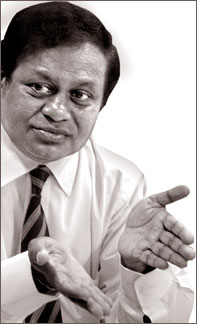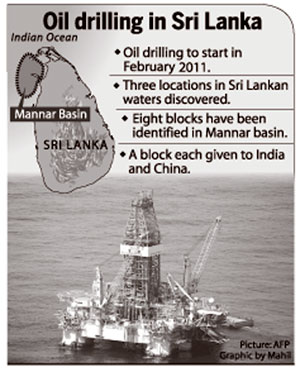|
Lanka heading towards a new era :
Oil drilling to begin early next year
By Shanika SRIYANANDA
 Minister of Petroleum Industries Susil
Premajayanth said the country is heading towards a new era with the
discovery of oil deposits in the Lankan soil. Minister of Petroleum Industries Susil
Premajayanth said the country is heading towards a new era with the
discovery of oil deposits in the Lankan soil.
He said according to research Sri Lanka
could have hopes for harvesting natural gas in the near future.
“The first oil drilling will commence in
February 2011”, he said.
Meanwhile, Sri Lanka has been able to save
US $ 200 million a year by commencing 24-hour oil pumping to the Colombo
Port.
Following is the excerpts of the interview:
Q: Searching for oil in the Lankan soil is one of the main
tasks of the Ministry of Petroleum Industries. Some critics say that it
is another dream. How successful is this research?
A: Three locations within our territorial waters have been
discovered by the Petroleum Resources Development Secretariat (PRDS).
According to the investigations, the Mannar Basin is one location, which
is now blocked. Of the eight blocks two have been given to India and
China.
After the first round of drilling, the Cairns Company has been given
another block. Following the international standards, they have done a
3D research and have decided to go ahead with drilling.
The first oil drilling will commence early next year. The PRDS is
calling for tenders for the other five blocks.
Q: If this venture is successful, will the fuel prices come
down?
A: There are many reports done on this issue. A research done
by an Australian university confirmed that there is either petroleum or
natural gas in our seas. If we are able to tap these resources, that
will be the future of this country.
India, has already commenced harvesting natural gas from the Godavari
Basin, which is next to the Kaveri Basin. Therefore, there is a
possibility of getting gas from this location. If we are able to tap
this resource, it will take Sri Lanka to a new era.
 Q: What are the plans to extend the services for the North? Q: What are the plans to extend the services for the North?
A: For the last 30-years the Northern part of the country did
not progress in par with other parts of the country due to LTTE
terrorism. It is under the leadership of President Mahinda Rajapaksa the
Northern people are gaining prosperity. Today the government has focused
its efforts to develop the country including the North and the East. My
Ministry has taken several steps to provide facilities for the people of
the North. Opening more new filling stations is one prime concern of the
Ministry.
Another important step taken was to transport fuel to the North by
road. This has brought the price reduction of fuel in the North. For
many years transportation of oil to the Northern province was done by
train. We have stores in Kankasanthurai. But now oil transportation from
Colombo to Jaffna is done via A-9.
I have recently found that the transportation chargers from Colombo
to Jaffna are higher than the other parts of the country. Then I made
arrangements to cut down transportation charges and that was passed down
to the customers. It resulted for the reduction of fuel prices.
Eight filling stations constructed under the Uthuru Wasanthaya are
functioning in Mannar, Vavuniya, Kilinochchi and Mullaithivu districts.
Q: What are the steps taken by the Ministry to make the Ceylon
Petroleum Corporation (CPC), profitable?
A: The CPC’s loss is mainly due to the power sector, which is
highly depended on fuel. The CPC has to supply diesel and furnace oil at
subsidised price. For example, the cost of a litre of furnace oil is Rs.
54 but the CPC sells it for Rs. 32 for private plants and to the CEB Rs.
22. As a result the CPC incurrs a massive loss monthly. If the power
sector can cut down their fuel usage and convert their power plants to
LNG, hydro or coal, the loss can be minimised.
Q: It is said a litre of petrol can be further reduced if the
taxes are slashed.
A: I disagree with this claim. No heavy taxes are imposed and
exercise tax was Rs. 25. Others add the terminal transportation,
distribution, administration, dealer margin and financial cost, to the
fuel price.
The exercise duty was imposed during the UNP regime. Could public
organisations run without taxation? Some will say to do away with the
taxes. Then how are we going to pay the government salaries. All these
are absurd.
The total cost of a petrol litre is Rs. 117 but it is sold at Rs.
115, diesel is Rs. 85 but sold at 73, Kerosene is Rs. 74 but sold at Rs.
51. These subsidised prices have result a huge loss to the CPC but we
have managed it slightly with the refinery.
Q: With the decision slash taxes on vehicle imports there will
be more vehicles on roads. Can the CPC cope up with the demand for fuel?
A: I don’t see a big demand. So far 200 to 300 vehicles have
been imported. It will take several years to increase the number of
vehicles.
Q: The LIOC has also urged the government to increase the fuel
prices as they claim that they can not sell fuel in par with the CPC
prices. What is your comment?
A: We can’t do that. Still we have not discussed about a price
revision. At the moment we maintain the same price.
Q: Are there any plans to import fuel when the prices are low?
Do we have enough storage facilities?
A: No plans to buy fuel beforehand but with the new terminals
at Muthurajawela we would be able to purchase more fuel.
Q: What is the progress of the controversial hedging deal?
A: The two arbitration cases are in Singapore and UK. We have
consulted the Attorney General for his advice and waiting his reply to
get further action.
Q: What are the new plans on cards?
A: Under the previous administration construction of the
offshore pipeline at Muthurajawela was commenced and it is now nearing
completion. It will be fully computerised soon.
Over 13 filling stations will be opened in the North and construction
of six filling stations - Pooneryn, Paranthan, Vellankulam, Mallavi,
Pallei, and Nadunkerni is nearing completion. |

